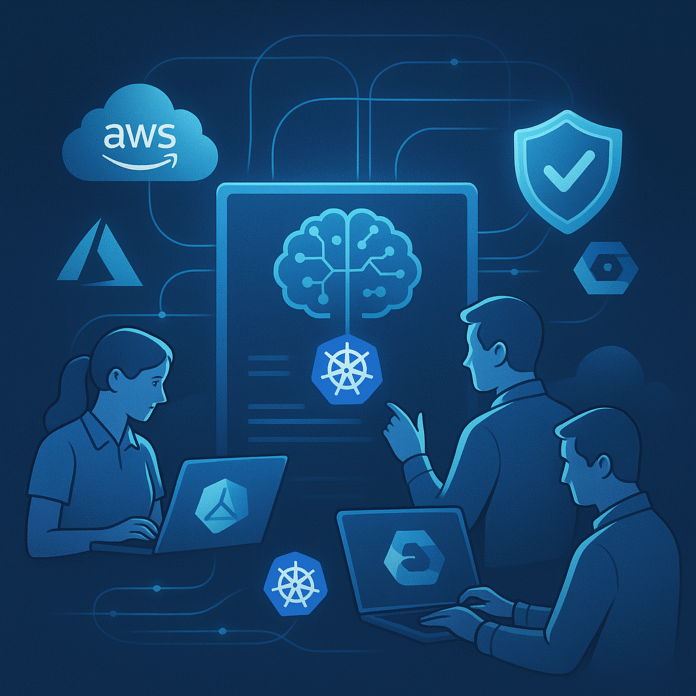Kubernetes has already done the hard work of unifying how we run applications at scale. Now, the Cloud Native Computing Foundation (CNCF) is tackling the next step: how we run AI on Kubernetes.
At KubeCon 2025 in Atlanta, CNCF announced the Certified Kubernetes AI Conformance Program, a new open standard to help IT infrastructure teams run AI workloads consistently across platforms, vendors, and environments.
It’s a move that feels overdue. As organizations bring machine learning (ML) and Generative AI models into production, the ecosystem is fragmenting fast. Frameworks like TensorFlow, PyTorch, and JAX behave differently across clusters. GPU scheduling, data access, and network configurations vary from one vendor to another. The result: unpredictable performance, portability headaches, and wasted engineering effort.
CNCF new certification program is designed to fix that by introducing a common, open, and testable baseline for running AI workloads on Kubernetes.
Why CNCF Certified AI Conformance Program Matters for Practitioners
This is a big deal for the platform engineers actually building and deploying AI systems. Today, running a model on Kubernetes can feel like a guessing game: what works on one cluster might fail on another. CNCF new conformance program aims to eliminate that uncertainty.
Here’s why it matters:
- Consistency across clouds – Whether you’re on AWS, Azure, GCP, or on-prem, certified platforms will guarantee that AI workloads behave the same way.
- Fewer surprises in production – Teams can count on standard APIs for GPU integration, job networking, and storage handling, key areas that often break between environments.
- Open and community-driven – The program is being built in the open, guided by the CNCF’s Working Group AI Conformance, so practitioners can contribute directly to the standards they’ll depend on.
In practical terms, it means less time troubleshooting infrastructure and more time training and serving models.
Why Now: The AI Wave Meets Cloud Native Maturity
The timing couldn’t be better. AI has moved from research into real operations. According to Linux Foundation research cited by CNCF, 82% of organizations are already building custom AI solutions, and 58% run them on Kubernetes. Yet, without shared standards, every team reinvents the wheel, building one-off scripts, custom controllers, or bespoke pipelines.
CNCF is stepping in before the AI ecosystem fractures completely. Just as the original Kubernetes Conformance Program unified container orchestration across 100+ platforms, this AI-focused initiative aims to do the same for model training and inference workloads.
By defining minimum capabilities for running popular frameworks like TensorFlow and PyTorch, and by providing a validation suite, CNCF is setting the foundation for a portable AI infrastructure, one that’s not locked to a single cloud or vendor.
This move echoes what Kubernetes itself achieved: interoperability through open governance, not corporate decree.
The Buyer’s Perspective: Confidence and Portability
For technology leaders, the Certified Kubernetes AI Conformance Program offers something invaluable: predictability.
Enterprise buyers have struggled with questions like:
- “Will our model training setup run the same way on another cloud?”
- “Can we migrate AI workloads without re-engineering everything?”
- “Are we meeting compliance and reproducibility standards?”
This certification gives them a clear answer. A “CNCF Certified” label signals that a Kubernetes-based AI platform meets the same interoperability and reliability criteria everywhere it runs. It turns an unpredictable, experimental AI stack into something auditable, portable, and enterprise-ready.
It’s not hard to imagine the long-term impact certified AI conformance could become a must-have checkbox for any AI platform vendor that wants to be taken seriously by enterprise buyers.
The Bigger Picture: Building Protection for the AI Era
CNCF’s announcement isn’t about adding new software; it’s about adding structure. The AI ecosystem is moving fast, and Kubernetes is already the de facto substrate for training, serving, and scaling models. But as complexity grows, standards become survival tools.
By defining what “AI-ready Kubernetes” means, CNCF is helping the community avoid the kind of fragmentation that once plagued early container adoption.
The initiative is open-source, community-led, and transparently developed on GitHub (cncf/ai-conformance) under an openly published charter. It represents the best of the cloud native model: collaboration, validation, and trust built through shared testing and real-world results.
Final Take: The Missing Link Between AI and Cloud Native
With this new conformance program, CNCF is doing for AI what it did for containers nearly a decade ago, setting the rules that make innovation sustainable.
- For developers, it promises fewer configuration headaches.
- For platform teams, it offers confidence that workloads will scale and recover consistently.
- For the industry, it signals a maturing AI ecosystem built on shared, open foundations.
As AI workloads keep growing in size and complexity, CNCF’s Certified AI Conformance Program may become the quiet standard that keeps everything running smoothly.
In a world where AI is rewriting the rules, CNCF is writing the guardrails.


